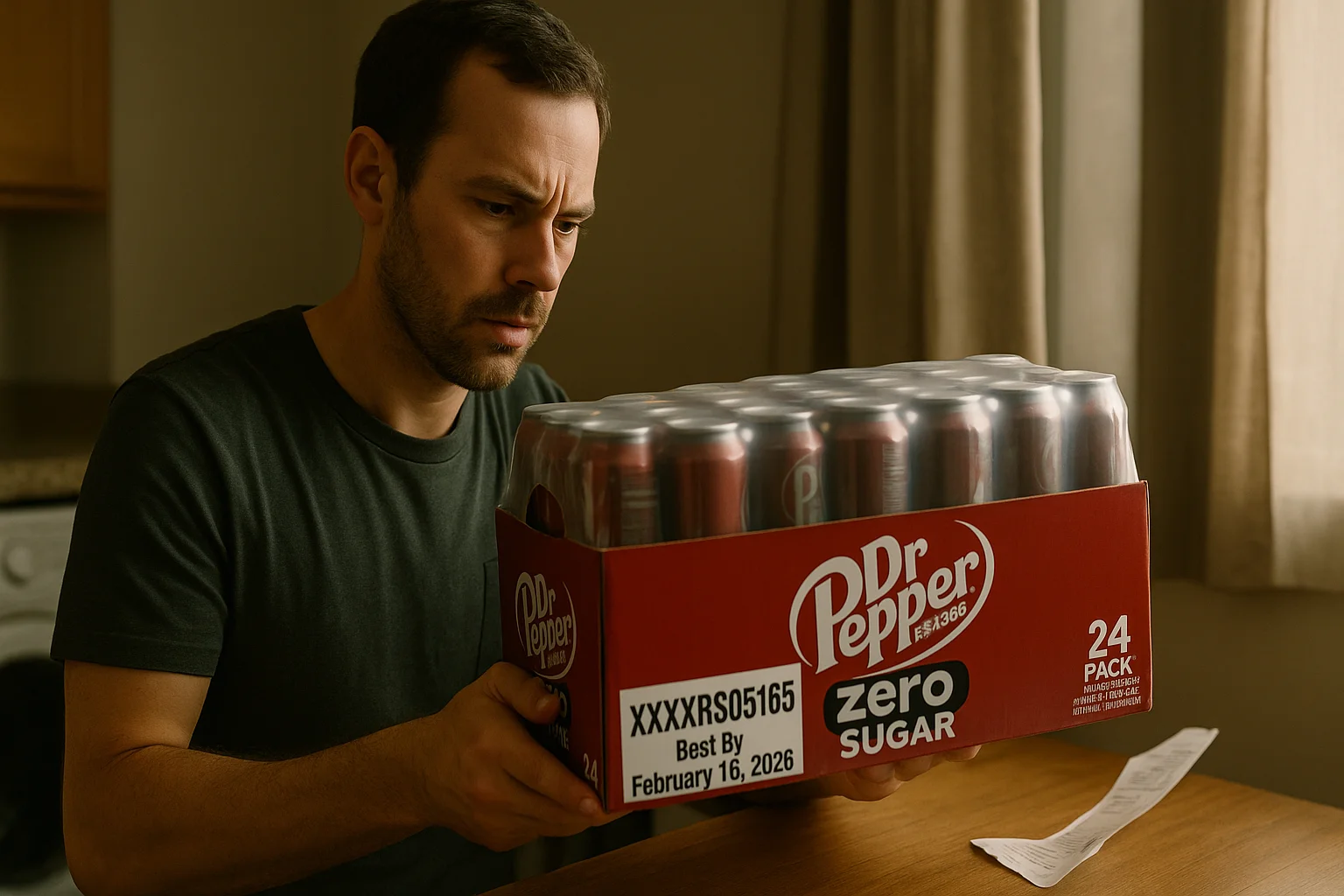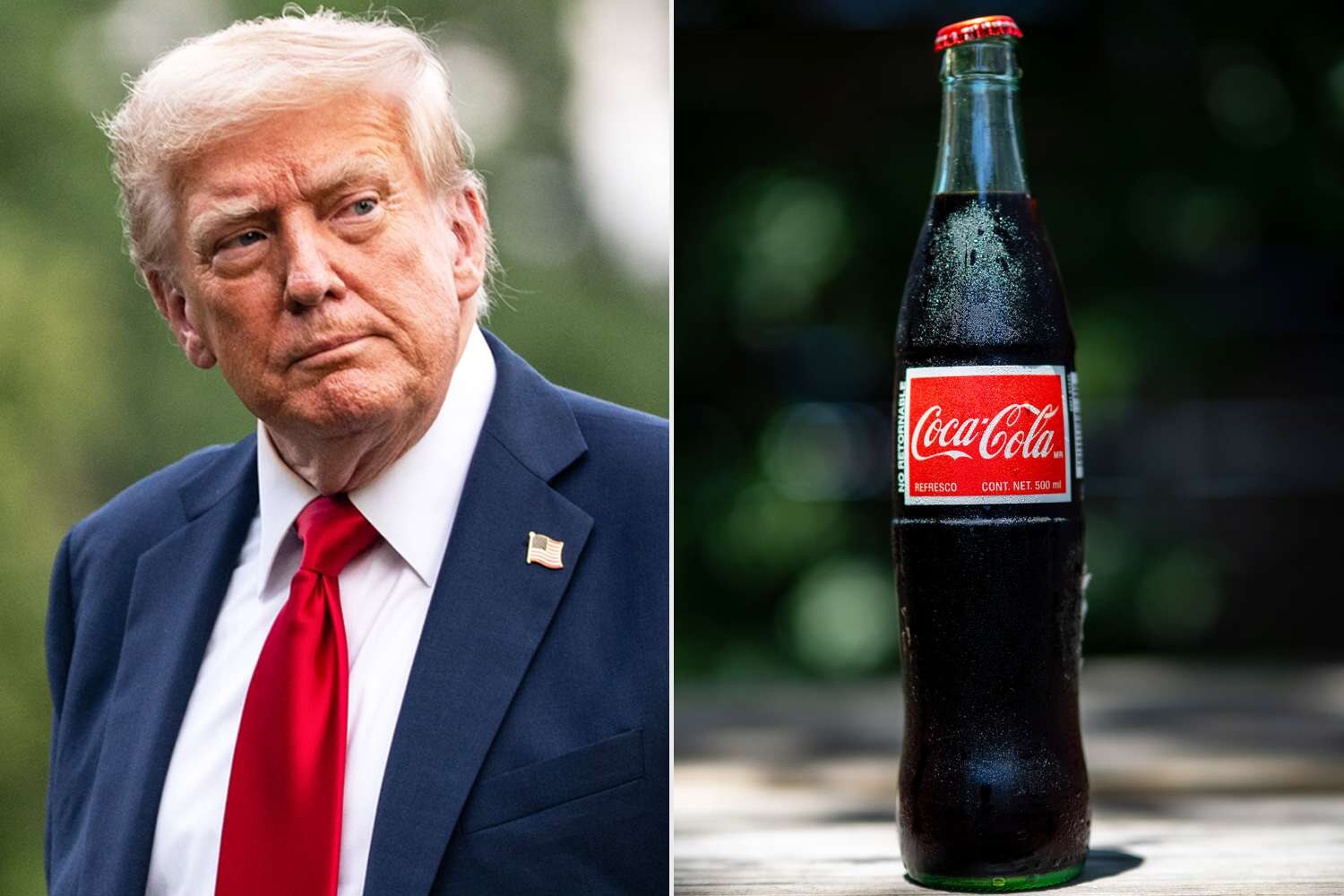
Dr Pepper Being Recalled - Here's What You Need to Know
Oh no!
Published June 16, 2025
Advertisement
Advertisement
1. The Dr Pepper Recall Unfolds

A major beverage recall has captured national attention as more than 19,000 cases of Dr Pepper Zero Sugar were pulled from store shelves after being found to contain regular, full-sugar soda instead of the sugar-free formula. This revelation emerged following reports that people relying on zero-sugar sodas—especially those with diabetes or specific dietary restrictions—were unexpectedly exposed to drinks containing 39 grams of sugar per 12-ounce can. The affected products were shipped and sold in Florida, Georgia, and South Carolina, sending waves of concern throughout those regions and sparking heightened vigilance among consumers everywhere. The recall was voluntarily initiated by Keurig Dr Pepper and Pepsi Beverages Company in late May, following routine checks and consumer complaints. What seemed at first to be a localized issue rapidly escalated, prompting an upgrade to a Class II recall by the U.S. Food and Drug Administration on June 5, 2025. According to the FDA, a Class II recall is triggered when a product may cause temporary or medically reversible adverse health consequences, though the probability of serious or lasting health effects is remote. As media outlets reported on the recall, customers who had recently purchased Dr Pepper Zero Sugar were urged to inspect their stock immediately and to remain cautious with all labeled sugar-free beverages. The recall involved both 12-pack and 24-pack cases of 12-ounce cans with a specific product code and “best by” date of February 16, 2026. The situation underscored the critical importance of accurate product labeling in protecting public health, particularly for people with conditions like diabetes that make sugar content a serious medical issue. The swift action of both the manufacturers and federal regulators highlighted the potential danger lurking in what appeared to be an everyday consumer product. As the story gained traction, shoppers, retailers, and health professionals alike were called upon to stay alert, check labels carefully, and share information widely to help prevent any further incidents.
Advertisement
2. What Went Wrong in the Supply Chain

The mislabeling debacle began at a PepsiCo bottling facility in Jacksonville, Florida, which is licensed to produce Keurig Dr Pepper-branded products. There, an error in the production or packaging process led to regular Dr Pepper being poured into cans labeled as Dr Pepper Zero Sugar—a mistake undetectable by sight, smell, or even taste for many consumers. Product code XXXXRS05165, paired with the “Best By” date of February 16, 2026, became the critical identifier for affected cans, but the packaging otherwise looked completely standard. The error brought to light the immense challenges manufacturers face in ensuring accuracy across multiple production lines, especially when similar products share similar branding and packaging. Quality control systems designed to catch such mistakes evidently failed at some point, resulting in a mass distribution of potentially harmful products to three southeastern states. Although the issue was discovered before it led to any confirmed widespread health crises, the risk was real and immediate for anyone who trusted the labeling on the can. For people with diabetes or those on strict low-sugar or ketogenic diets, even a single can of mislabeled soda could cause harmful spikes in blood sugar or trigger other health complications. News of the recall reverberated through supply chains and retail networks, as stores scrambled to identify and remove affected products from their shelves. Industry observers noted that the recall not only posed health risks, but also shook consumer confidence in food and beverage labeling more broadly. Keurig Dr Pepper, in response, emphasized its commitment to consumer safety and outlined steps being taken to tighten quality controls at all partner bottling plants. Ultimately, the incident served as a stark reminder that even well-established brands can encounter serious lapses in the fast-moving world of mass production.
Advertisement
3. Identifying the Dangerous Batches

For consumers, identifying the dangerous Dr Pepper Zero Sugar cans required vigilance and close attention to packaging details. The only way to distinguish the recalled soda was by checking the product code “XXXXRS05165” and the “Best By” date of February 16, 2026, both printed on 12- or 24-pack cases. Because the cans themselves were identical to the usual sugar-free variety, a quick glance was not enough—every consumer needed to take the extra step. Affected cases were distributed exclusively in Florida, Georgia, and South Carolina, but secondary sales and travel meant the cans could turn up far outside those states. Major grocery retailers and convenience stores began notifying customers and processing returns, and local news outlets provided step-by-step guides to checking product codes. Consumers who found recalled cans were instructed to return them to the place of purchase for a full refund or dispose of them safely. The urgency of the situation was amplified by the fact that sugar content is not always immediately obvious upon tasting, especially for those accustomed to diet sodas. Retailers, following FDA guidelines, swiftly pulled the offending products from shelves and posted notices at points of sale. Despite these measures, concern lingered that some consumers would not hear of the recall or would overlook the small print on the packaging. This made community vigilance essential, with families, friends, and online communities spreading recall details through social media and word of mouth. The message was clear: even trusted labels can be wrong, and only proactive steps could prevent serious health consequences.
Advertisement
4. The FDA’s Classification and Public Response

The FDA’s decision to classify the recall as Class II added a sense of urgency and clarity to the unfolding situation. A Class II recall means the product could cause temporary or medically reversible adverse health consequences, a serious warning for those with chronic conditions like diabetes or heart disease. The official announcement emphasized the need for heightened awareness among all consumers, but especially those for whom sugar intake poses real risks. Media coverage stressed the importance of not dismissing the recall as a minor technicality—medical complications from unintentional sugar consumption can be swift and severe. The Centers for Disease Control and Prevention (CDC) also weighed in, highlighting the broader health impacts of sugar-sweetened beverages and reinforcing why accurate labeling is non-negotiable. Consumer advocacy groups called for more robust checks in the manufacturing process and more transparent communication from brands when problems do arise. Keurig Dr Pepper and Pepsi Beverages Company reiterated that no other Dr Pepper products were affected by this recall and that immediate action was taken to remove the problematic batches. Still, the recall reignited debate about the safety of processed foods and drinks and the systems designed to keep them in check. Federal authorities encouraged anyone who suspected they had consumed a recalled product to monitor their health closely and seek medical advice if any symptoms developed. Some consumers expressed frustration over the lack of clarity in early recall announcements and urged the FDA and manufacturers to simplify recall information in the future. As the situation evolved, public trust in beverage safety became a top priority for both regulators and brands alike.
Advertisement
5. Impact on People with Diabetes and Health Risks

The recall was especially alarming for people living with diabetes, as well as those who depend on sugar-free products for other health reasons. Consuming 39 grams of sugar unknowingly can cause significant blood sugar spikes, putting diabetics at immediate risk of hyperglycemia and associated complications. Health experts warned that even one mislabeled can could necessitate urgent medical intervention, and advised diabetics to monitor blood sugar more frequently if exposed. Beyond diabetes, people with heart disease, obesity, and certain metabolic conditions were also cautioned about the effects of hidden sugars in their diets. Doctors and nutritionists took to news outlets and social media to amplify recall warnings and explain the potential health fallout from a labeling error of this scale. The recall also reignited longstanding debates about the overall health risks associated with sugary beverages, from dental problems to increased risk of gout and cardiovascular disease. The Centers for Disease Control and Prevention reminded the public that sugary drinks are a major driver of several chronic illnesses in the U.S. population. For many, the recall felt personal, as sugar-free sodas are not just a preference but a necessity for safely navigating everyday life. Advocacy organizations called on brands to prioritize the needs of medically vulnerable consumers and to issue clearer recall alerts in the future. Some local clinics and diabetes support groups even began distributing printed recall notices to help spread the word among their communities. In the aftermath, the message was clear: accurate ingredient information is not merely a convenience—it’s a matter of public health.
Advertisement
6. Where the Recall Hit and How Stores Responded

The three states affected by the Dr Pepper Zero Sugar recall—Florida, Georgia, and South Carolina—became ground zero for consumer action and retailer response. Large grocery chains and local retailers worked rapidly to remove affected cases from shelves, often posting prominent signs and deploying staff to help answer customer questions. Stores also implemented return policies for recalled cans, offering refunds or credit to customers who brought back the affected product with the correct product code and best by date. News stations across the Southeast ran detailed segments on how to identify the dangerous cans, and online resources quickly popped up to guide shoppers through the process. Some retailers reported that even with these measures, concerned customers from outside the impacted states called in to ask about the safety of their own Dr Pepper purchases. Secondary markets, like online resellers and bulk food distributors, were also monitored for signs that recalled cans might be circulating more widely than initially reported. Dr Pepper’s customer service lines and email help desks were inundated with questions and requests for information as word of the recall spread. In response to community concerns, some retailers proactively checked their entire inventory of Dr Pepper products and reassured customers that only specific batches were affected. State and local health departments played a supporting role, working with the FDA and manufacturers to track the recall’s effectiveness and issue additional alerts as needed. The episode demonstrated the complexity of modern food and beverage distribution networks, where a single manufacturing mistake can ripple rapidly through multiple states. Ultimately, the incident became a test case for how quickly and effectively manufacturers and retailers could work together to safeguard public health.
Advertisement
7. The Broader Context of Food and Beverage Recalls

The Dr Pepper recall was not an isolated incident, but part of a larger wave of food and beverage recalls that have made headlines in recent years. Earlier in June 2025, Coca-Cola recalled Topo Chico Mineral Water in Arizona, Louisiana, Nevada, New Mexico, and Texas due to the risk of Pseudomonas bacteria contamination. This water recall was particularly concerning for people with weakened immune systems, as the bacteria involved can cause serious infections in the blood, lungs, or urinary tract. Other recent recalls have targeted apple juice, eggs, granola bars, green beans, and a range of processed foods, reflecting the challenges manufacturers face in maintaining safety and quality at scale. Although the total number of recalls issued by the FDA and USDA actually declined in 2023, the number of hospitalizations and deaths linked to contaminated or mislabeled products more than doubled the following year. Data from 2024 showed 487 hospitalizations and 19 deaths tied to recalls—a stark reminder of the consequences when food safety systems fail. Experts attributed some of the rise in health impacts to increased consumer awareness, better reporting systems, and more frequent testing for contamination or labeling errors. Advocates argue that, given the complexity of modern supply chains, robust traceability and rapid response are essential to limit the scope of harm when recalls are necessary. The food industry, meanwhile, has invested in better automation, digital tracking, and communication protocols to keep pace with evolving risks. Consumers are advised to stay proactive—signing up for product safety alerts, keeping receipts, and double-checking labels on all food and drink purchases. In this environment, every recall becomes a case study in the ongoing challenge of keeping the nation’s food and beverage supply safe.
Advertisement
8. What Consumers Should Do Now

For anyone who suspects they may have purchased affected Dr Pepper Zero Sugar cans, immediate action is crucial. Check all 12- and 24-pack cases for the product code “XXXXRS05165” and the “Best By” date of February 16, 2026, which signal inclusion in the recall. If you find recalled cans, return them to the retailer for a full refund, or safely dispose of them if a return is not possible—do not consume the soda under any circumstances. Diabetics or people with other medical concerns who drank the mislabeled soda should monitor their health closely, checking blood sugar frequently and consulting with a healthcare provider if any symptoms arise. Remain vigilant about recall alerts, and consider signing up for notifications from the FDA or USDA, who offer email and text updates on food safety incidents. Keep an eye on news from grocery chains and brands on social media, as they often provide the fastest updates on recall developments and refund procedures. Save your receipts for all major food and drink purchases; they can be essential for proving purchase and processing returns in the event of a recall. Share recall information with family and friends, especially those who may not regularly follow food safety news or who rely on others to do their grocery shopping. In cases where uncertainty remains, consult the FDA’s official recall database or reach out to manufacturers directly for confirmation. This recall also serves as a reminder to routinely check ingredient labels and product codes before consumption, even with trusted brands. Staying proactive and informed is the best way to protect yourself and your loved ones from accidental exposure to dangerous or mislabeled products.
Advertisement
9. Lessons for the Beverage Industry

The Dr Pepper recall has sparked serious conversations within the beverage and broader food industries about best practices and the future of product safety. Companies are reevaluating their quality assurance protocols, especially when it comes to labeling and cross-contamination between similar products. Automated checks, frequent product audits, and clear lines of communication between bottling facilities and headquarters are being scrutinized and upgraded. Brands have learned that consumer trust, painstakingly built over decades, can be undermined in an instant by a labeling mistake. Manufacturers are now investing more in advanced tracking technologies that can pinpoint exactly where and when errors occur within the production process. Industry leaders are also working more closely with regulators, developing shared best practices and contingency plans for when recalls do become necessary. Public relations strategies are being refined to ensure recall communications are prompt, transparent, and easy for consumers to understand. Insurers and risk managers are also reviewing their coverage and liability structures in light of the new challenges posed by complex, distributed supply chains. The episode has made clear that, in today’s marketplace, safety is not just a regulatory requirement—it’s an essential competitive advantage. Consumer feedback from this and other recalls will likely influence product development, marketing, and packaging decisions for years to come. In the wake of the Dr Pepper recall, the beverage industry faces a new era of accountability, vigilance, and ongoing adaptation to evolving risks.
Advertisement
10. Moving Forward: The Importance of Vigilance

As the dust settles on the Dr Pepper Zero Sugar recall, consumers, regulators, and manufacturers alike are left to reflect on lessons learned and steps for the future. For the public, the incident is a wake-up call that underscores the importance of reading labels, checking product codes, and staying connected to recall alerts. For the industry, it’s a stark reminder that safety systems must be continually updated and rigorously enforced—one small oversight can have massive real-world consequences. Regulatory agencies will likely tighten oversight and push for even greater transparency from brands, with an emphasis on clear, timely communication when recalls arise. Retailers, too, will review how they handle recalls, seeking faster, more efficient methods to remove affected products and inform customers. Health professionals are encouraged to keep educating patients about the risks of hidden sugars and the significance of food safety alerts. Meanwhile, consumer advocacy groups continue to push for more robust reporting requirements and better access to recall information, particularly for at-risk populations. Every recall, no matter how contained, serves as a reminder of the shared responsibility across the entire food and beverage ecosystem. Ultimately, ongoing vigilance—from the factory floor to the family refrigerator—is the key to preventing harm and maintaining public trust. As more data is gathered and systems improved, the hope is that both the frequency and the impact of such recalls will diminish over time. Until then, the story of the Dr Pepper Zero Sugar recall stands as a testament to the critical role of accuracy, transparency, and shared accountability in the world of food safety.
Advertisement
Advertisement
You May Also Like






